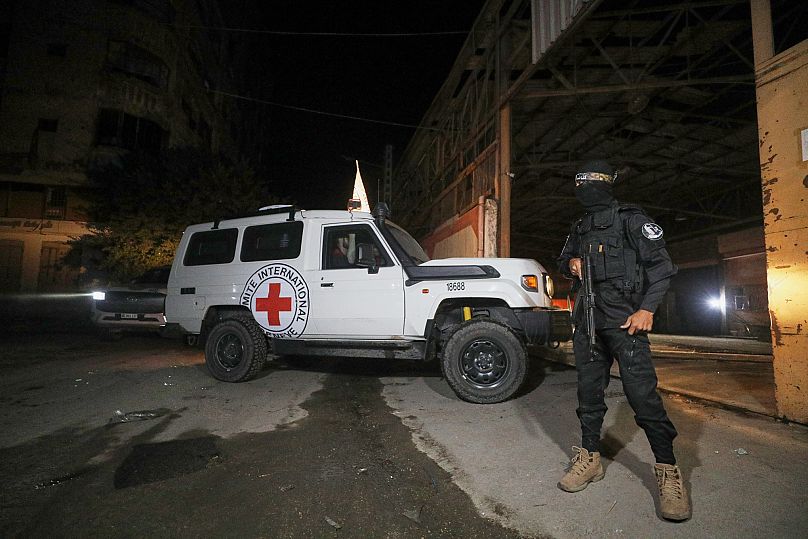Earlier, the Israeli military said forensic testing showed that one of the bodies handed over by Hamas does not match any of the hostages. ” There was no immediate word on whose body it was.
Israeli authorities said on Wednesday that they received the remains of two more hostages, hours after the military said that one of the bodies previously turned over was not that of a hostage, adding to the confusion in the fragile peace deal.
 ADVERTISEMENT
ADVERTISEMENT
 ADVERTISEMENT
ADVERTISEMENT
The coffins carrying the remains were transferred by the Red Cross from Hamas late Wednesday, and upon returning to Israel, were sent to a forensic lab in Tel Aviv, according to the military, which cautioned that the hostages’ identities had yet to be verified.
Israeli PM Benjamin Netanyahu's office confirmed the reception of the bodies, saying Israel had received, through the Red Cross, coffins containing the bodies of hostages, which were now awaiting official identification.
"The IDF urges the public to act with sensitivity and wait for official identification, which will first be communicated to the families of the deceased hostages," the statement said.
As part of the deal, four bodies of hostages were handed over by Hamas on Tuesday, following four on Monday that were returned hours after the last 20 living hostages were released from Gaza. In all, Israel has been awaiting the return of the bodies of 28 hostages.
However, controversy emerged over one of the returned bodies after the Israeli military said forensic testing showed that “the fourth body handed over to Israel by Hamas does not match any of the hostages.”
There was no immediate word on whose body it was, but as concerns grew over Hamas' commitment to returning all 28 bodies as stipulated in the ceasefire agreement, the group's armed wing said in a statement on Wednesday that it was committed to the deal.
"The remaining bodies require significant efforts and specialised equipment to search for and retrieve, and we are making a great effort to close this file," media reports quoted the armed group's statement.
As of early Thursday, some 19 bodies remain unaccounted for by Hamas.
For its part, Israel returned 45 more bodies of Palestinians from Israel, another step in the implementation of the ceasefire agreement, bringing to 90 the total number of bodies returned to Gaza for burial. Gaza's forensics team examining the remains said they showed signs of mistreatment.
On Monday, Israel freed around 2,000 Palestinian prisoners and detainees in exchange for the release of the hostages.
Bodies returned to Gaza show abuse signs, officials say
Meanwhile, Israel is expected to turn over more bodies, though officials have not said how many are in its custody or how many will be returned.
It is unclear whether the remains belong to Palestinians who died in Israeli custody or were taken from Gaza by Israeli troops. Throughout the war, Israel’s military has exhumed bodies as part of its search for the remains of hostages.
As forensic teams examined the first remains returned, Gaza's Health Ministry on Wednesday released images of 32 unidentified bodies to help families recognise missing relatives.
According to local officials, many appeared decomposed or burned, and some were missing limbs or teeth, while others were coated in sand and dust.
Health officials have said Israeli restrictions on allowing DNA testing equipment into Gaza have often forced morgues to rely on physical features and clothing for identification.
The forensics team that received the bodies said some arrived still shackled or bearing signs of physical abuse.
Sameh Hamad, a member of a commission tasked with receiving the bodies at Khan Younis’ Nasser Hospital, said some arrived with their hands and legs cuffed.
“There are signs of torture and executions,” he told The Associated Press. The bodies, he said, belonged to men ages 25 to 70. Most had bands on their necks, including one that had a rope around the neck.
Most of the bodies wore civilian clothing, but some were in uniforms, suggesting they were militants.
Hamad said the Red Cross provided names for only three of the dead, leaving many families uncertain of their relatives’ fate.
The two-year war sparked by Hamas' brutal attack and murder of 1200 people across Israel on 7 October 2025 has killed nearly 68,000 Palestinians, according to Gaza's Health Ministry, which is part of the Hamas-run government in Gaza.











